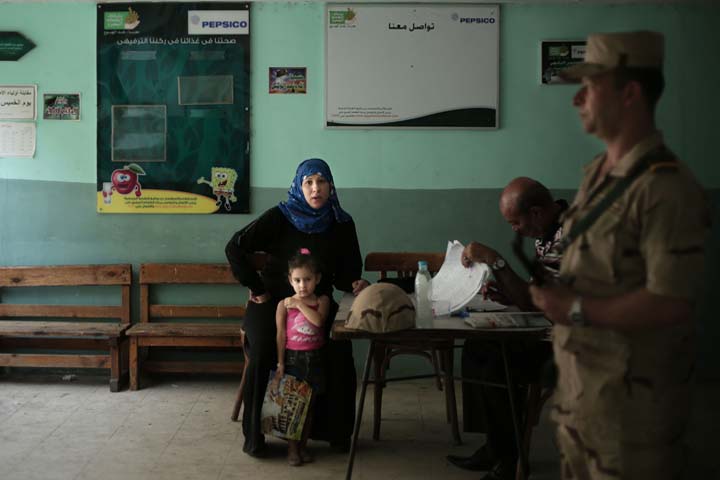Advertisement
Egypt’s Elections: Islamists, Liberals And The Generals
ResumeWith guest host John Donvan.
Egyptians vote again and General Sisi is set to win. It has been a roller-coaster ride --from dictator Mubarak to the Muslim Brotherhood, it's back to a military strongman.

Democracy fails. That's the election taking place this week on the other side of the earth in Egypt, the nation where Arab Spring supposedly was going to change everything. Instead, the army's back in charge, deciding who can run and who's banned. On the banned list: Egypt's biggest party, the Muslim Brotherhood. They're missing from this election. Also missing? Any outrage from the White House that the game was cooked. Which raises the question: In places where Islamist parties are likely to win, just how committed is the US to democracy? This hour On Point: the Democratic election that isn’t. Not really.
-- John Donvan
Guests
Louisa Loveluck, Egypt corespondent for the Christian Science Monitor. (@leloveluck)
Shadi Hamid, fellow at the Project on U.S. Relations with the Islamic World at the Brookings Institution's Saban Center for Middle East Policy. Author of the new book, "Temptations of Power: Islamists & Illiberal Democracy in a New Middle East." (@shadihamid)
Robin Wright, journalist and author, distinguished scholar at the United States Institute of Peace and the Woodrow Wilson International Center. Author of “Rock the Casbah: Rage and Rebellion Across the Islamic World,” “The Iran Primer: Power Politics and U.S. Policy” and “The Islamists are Coming: Who They Really Are.” (@wrightr)
From The Reading List
The Atlantic: The Future of Democracy in the Middle East: Islamist and Illiberal — "Illiberal democracy has risen to prominence in part because Western Europe’s careful sequencing of liberalism first and democracy later is no longer tenable—and hasn’t been for some time. Knowing that democracy, or something resembling it, is within reach, citizens have no interest in waiting indefinitely for something their leaders say they aren’t ready for."
Christian Science Monitor: Egypt extends voting by a day in latest bid to boost low turnout -- "In a vote that has often resembled a coronation more than a contest, high turnout is crucial to the legitimacy of the results. Early returns show Mr. Sisi winning by a landslide. But the low turnout indicates that a large swath of voters – far more than just the Islamists who have been pushed underground – are not convinced the former military chief can fulfill his promises of security, stability, and economic growth in the deeply divided country. "
Washington Post: If Thailand is a coup, why wasn’t Egypt? — "The Obama administration ultimately side-stepped the decision on whether Egypt was a coup or not entirely. There seems to be a disconnect there, and it clearly wasn't lost on reporters at Thursday's State Department briefing. So what exactly is different about Thailand and Egypt? According to Jay Ulfelder, an American political scientist who focuses on political instability, not as much as the State Department hopes."
This program aired on May 28, 2014.